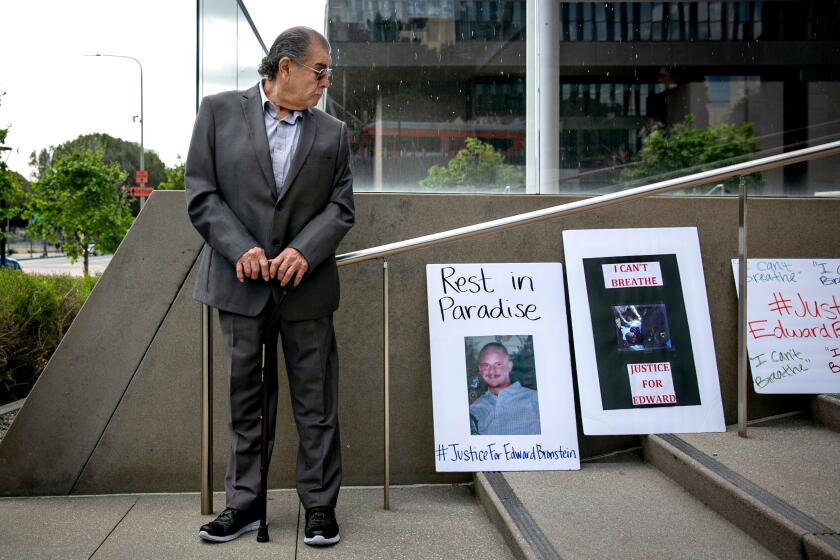Marine veteran who choked N.Y. subway passenger to death is charged with manslaughter

NEW YORK — The U.S. Marine veteran who choked a homeless man to death last week on a New York City subway has been arraigned on a charge of second-degree manslaughter and released on bond, authorities said.
Daniel Penny, 24, surrendered to police at the 5th Precinct in Manhattan around 8 a.m. Friday, 11 days after he used a fatal chokehold on Jordan Neely, 30, a subway performer who was experiencing homelessness and mental health issues.
Penny was later arraigned at the Manhattan Criminal Court. He was released on $100,000 bail, and his next court appearance is set for July 17. His lawyers have said he was acting in self-defense.
Under New York’s penal code, manslaughter in the second degree occurs when someone recklessly causes the death of another person. If convicted, Penny could face up to 15 years in prison.
“After an evaluation of the available facts and evidence, the Manhattan D.A.’s office determined there was probable cause to arrest Daniel Penny and arraign him on felony charges,” Dist. Atty. Alvin Bragg said in a statement. “The investigation thus far has included numerous witness interviews, careful review of photo and video footage and discussions with the medical examiner’s office. Jordan Neely should still be alive today, and my thoughts continue to be with his family and loved ones as they mourn his loss during this extremely painful time.”
The civil rights settlement is the largest in California history, said attorneys for the family of Edward Bronstein, whose desperate last moments were caught on video.
According to the criminal complaint, Neely boarded a northbound F train at 2nd Avenue in Manhattan; witnesses said he made threats and was scaring other passengers. Penny grabbed Neely from behind, put him in a chokehold and brought him to the ground. He continued to restrain Neely in a chokehold for several minutes. The complaint said “2 additional males aided the defendant by restraining Mr. Neely’s arms.”
When officers arrived at the scene, they found Neely unconscious and unresponsive. Neely was transferred to Lenox Healthplex Hospital, where he was pronounced dead.
Penny was questioned by police that day and released without charges. The city’s medical examiner later ruled the death a homicide.
Thomas Kenniff, a lawyer for Penny, said his client didn’t mean to harm Neely and is dealing with the situation with the “integrity and honor that is characteristic of who he is and characteristic of his honorable service in the United States Marine Corps.”
Donte Mills, a lawyer for Neely’s family, disputed Penny’s version of events, saying the veteran “acted with indifference. He didn’t care about Jordan, he cared about himself. And we can’t let that stand.”
“Mr. Neely did not attack anyone,” Mills said at a news conference Friday. “He did not touch anyone. He did not hit anyone. But he was choked to death.”
Some call the choking death of a man at the hands of another New York subway rider a criminal act.
Juan Alberto Vázquez captured part of the incident on video. Penny is seen with his arms wrapped around Neely’s neck and his legs around Neely’s waist as the pair are on the floor of the F train car. At several points, Neely kicks and tries to free his arms. Two other passengers appear to be pinning Neely’s arms as he struggles against the chokehold.
After about two minutes, Neely’s body appears to go limp. Penny maintains his chokehold for another 50 seconds, while another man continues to hold down Neely’s arms before letting go. After they release Neely, someone can be heard advising them to position him on his side in case he chokes.
In a public post on his Facebook page, Vázquez wrote in Spanish that he was on the subway heading to Yonkers when Neely got on.
“I don’t have food, I don’t have anything to drink, I’m fed up,” Neely yelled, according to Vázquez, who said he continued to shout: “I don’t mind going to jail and getting life in prison” and “I’m ready to die.”
Commuters have abandoned large swaths of a Los Angeles Metro train system plagued by crime and the scourge of drugs.
Neely was known for his choreographed Michael Jackson numbers in Times Square and other subway stations. The New York Times reported that he had dozens of arrests on minor crimes; at least four were for punching people, two of them in the subway system. He was considered by city outreach workers to be among the homeless New Yorkers most urgently in need of assistance and treatment.
The case has gripped New Yorkers, igniting conversations and protests over mental health treatment, crime, race, public safety and vigilantism. Some consider Penny, who is white, a hero; others have protested the violence against Neely, a Black man.
“To intervene is fine,” Samuel Dennis, 54, said. “But [Penny] didn’t use appropriate force that’s commensurate to the threat. There has to be a line drawn here.”
Paula Santiago, an interpreter for the New York City Department of Education, emphasized the need for greater mental health support and said she was “pleased” to see Penny charged.
“No one has the right to take the life of anyone else,” Santiago said. “This was atrocious.”
The shootings of four young people after simple, everyday mistakes have shone a spotlight on the proliferation of ‘stand your ground’ laws in the U.S.
Alex Alpert said he was hopeful that Penny would face consequences and that the video and resulting exposure put pressure on officials.
“That’s one of the pros of social media,” Alpert, an artist, said. “People can’t get away with that kind of stuff.”
Chris, who asked to not be identified by his last name, said Penny’s actions were excessive.
“We don’t need that. We don’t need a Batman here,” said Chris, adding that he’s waiting to see how the case plays out in court, where he expects to see the defense team lean into Penny’s Marine background.
The Associated Press contributed to this report.
More to Read
Sign up for Essential California
The most important California stories and recommendations in your inbox every morning.
You may occasionally receive promotional content from the Los Angeles Times.















